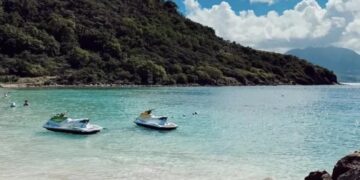In order to keep the animals safe from any harm and maintaining climate levels, the Commonwealth of Dominica has announced about creating the world’s first marine protected area for one of the largest animals of earth: the endangered sperm whale.
The details about the above mentioned has been made by the Prime Minister of Dominica, Dr Roosevelt Skerrit. The expression of Dominica making contribution towards this is directly pointing towards the effort of the nation in keeping the waters and the environment safe.
While making the announcement about it, the government of Dominica, said that, “Over 800 square kilometers of royal blue waters on the western side of the island nation that serve as the key nursing and feeding grounds will be designated as the reserve.”
Adding further on this, PM Roosevelt Skerrit, said that, “We want to ensure that these majestic and highly intelligent animals are safe from harm and continue keeping our waters and climate healthy.”
Moreover, the above mentioned step taken by the government of Dominica is gaining lauds from across the world as the scientists are stating that this will not only protect animals, but will also help in fighting the climate change.
Meanwhile, a while biologist and the founder of the Dominica Sperm Whale Project, a research program focused on the sperm whales in the eastern Caribbean, added that, “Sperm whales defecate across the surface as they shut down non-important functions mainly when they dive to depths of up to 10,000 feet. Result of which, the nutrient-rich poop remains along the ocean surface and creates plankton blooms, which captures carbon dioxide int eh atmosphere and drag it to the ocean floor when they die.”
It is also believed that the sperm whales in Dominica defecate more than whales anywhere else, which is still unclear. Considering which, Gero added that, “It could be that they are eating twice as much, or maybe there is something specific about the squid that they are eating. To some of the context, sperm whales are fighting the climate change on our behalf.”
“Less than 500 sperm whales are believed to live in the waters surround the island nation of Dominica, part of a population that moves along the Lesser Antilles chain, swimming as far south as St. Vincent and north into Guadeloupe,” says Gero.
He added that, “Sperm whales are matrilineal society, with young males leaving and switching oceans at some point in their lives. Result of which, protecting the species is the key, especially if few female calves are born. One calf being entangled means the end of the family.”
“In waters across Dominica, sperm whales have been hit by large ships, entangled in fishing gear and affected by agricultural runoff, limiting their survival. In the pre-whaling days, an estimated 2 million sperm whales roamed the Earth’s deep waters before they were hunted for oil used to burn lamps and lubricate machinery. Now, some 800,000 are left,” Gero said.
Meanwhile, the government of Dominica said that the reserve will be allowing sustainable artisanal fishing and delineate an international shipping lane to avoid more deaths of sperm whales, which have the largest brains in the world and can even grow up to 50 feet.
Following the completion of the reserve, the prime minister of Dominica stated that, “The Dominica administration will appoint an office and observers to make sure that the whale tourism rules are applied. The visitors and tourists can still swim with the sperm whales and see them from a boat, but in the limited numbers.”
The move was praised by scientists and conservationists including Enric Sala, an explorer-in-residence at National Geographic.



























